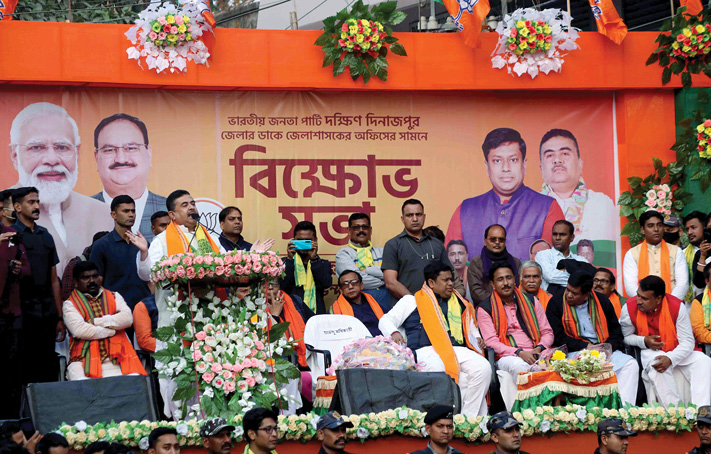West Bengal is a perfect case study of a free market. It protects those who engage in this market and punishes the disruptors at the same time.
Political parties need money to run their affairs. Such money comes from donations of supporters, as also beneficiaries from the party’s stands and decisions. There are some rules framed in democratic countries on collection of donations by political parties so as to help them contest elections. If the party is in power, collection of funds is easier. More so if the party is running a vibrant economy where a bit tweaking of rules and processes here and there can help trade and industry and result in fat donations to the party coffer from the beneficiaries of such tweaking. But how will political parties survive where business is not exactly booming?
In the age of market economy, the right choice would be to privatise the administrative process and collect dividend from the beneficiaries. There is hardly any difference between
Viewed from the pure market economy perspective, the West Bengal government’s role in appointment of school teachers and staff cannot be unduly criticised. If some 325 aspirants of primary school teachers’ jobs can dole out an estimated Rs 19 crore to some influencer in a part of the Hooghly district of West Bengal, one simply can wonder at the size of such untapped market in the state. Where there is a market, that has willing buyers and sellers for products like jobs, in an open economy there will be trading. That is what took place in West Bengal. Curiously, judges from Calcutta High Court in particular, are taking umbrage at the seamless job market that prevailed in West Bengal. Sadly, judges are not supporters of such “free” markets it seems. They go by certain laws framed at some point in time and stick to the same.
Judges are not the only spoilsport in hurting the cause of a flourishing “free” market, there are others as well. Take this curious case of an NGO in Jalpaiguri in West Bengal. When an ailing old woman, Lakshmirani Diwan, passed away at the town’s hospital, her son and husband tried to hire an ambulance to take the dead woman’s body back to their village 50 km away. In a free market economy, prices of ambulances depend on market factors. In this case it was beyond the paying capacity of the deceased family. So they started walking towards their village with the old woman on their shoulders. Here intervened a market disrupting NGO, Ankur Das, who provided his ambulance to ferry the dead woman to her village. Luckily, the administration there acted against the disrupting NGO on the complaint of the town’s ambulance association. The free market disrupting NGO was arrested by Jalpaiguri police for hurting the free market’s rules.
West Bengal is a perfect case study of a free market. It protects those who engage in this market and punishes the disruptors at the same time. Problem arises when certain disruptors are authorised to adjudicate on such cases. In a free market, free speech plays a critical role. For instance, in the case of the Jalpaiguri incident, the police in the town was alert and arrested the disruptor NGO. But what should the police do when market participants express grievances against judges who defy the free market rules? Free speech includes expressing views through various media that include posters. That is what a section of market participants did and pasted posters in some parts of Kolkata. This act of dissemination of free speech is viewed, curiously, as contempt by certain non-participants of the market.
In a free market, participants are free to participate or abstain. That includes right to abstain from even certain courts. Lawyers who believe in free market economy and its philosophy are therefore not participating in exchanges of a certain market disrupting adjudicating officer, Justice Rajasekhar Mantha of Calcutta High Court. And there are good reasons for that. Didn’t Justice Mantha initiate suo moto contempt proceedings against protesting lawyers who are steadfast believers of free market? In a free market like West Bengal such disruptions must be condemned. The state administration, rightly therefore, acted against a lawyer in the panel of government lawyers, who defied the free market ban of the court of Justice Mantha and dismissed him from the panel.
There is no two opinion that a government’s involvement in the lives of people should be limited and this is what the present administration in West Bengal practises. It was the great economist Milton Friedman who said that the most important single central fact about a free market is that no exchange takes place unless both parties benefit. The so-called recruitment cases now being adjudicated in the Calcutta High Court ignores this point. Those who paid money for jobs—assuming that they did—and those who received it—as can be seen in case of the small-time party leader of Hooghly mentioned earlier—both benefited. There was no complaint from any such market participants. Yet the courts opened cases based on certain persons who were not part of this perfect free market that the state of West Bengal had been running for ten long years.
Sadly, some do not have faith in the free market with Bengal characteristics. Once they get suitably educated there will come a time when the administration of West Bengal will be hailed as the harbinger of the free market administration. Till then debates will rage and the politics boil over.
Author Sugato Hazra’s latest book is “Losing the Plot: The Political Isolation of Bengal”.

